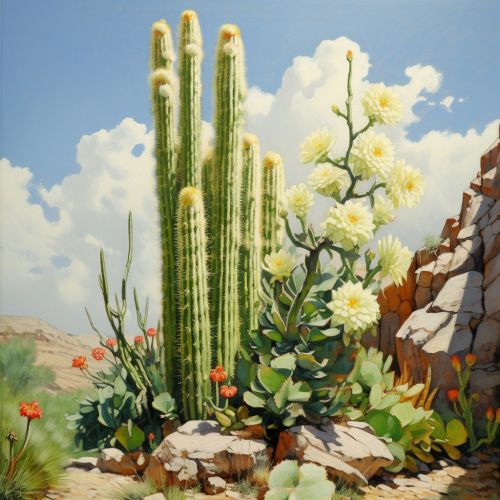Echinopsis pachanoi
Taxonomy and Description
Echinopsis pachanoi, also known as the San Pedro cactus, is a fast-growing columnar cactus native to the Andes Mountains in Peru and Ecuador. It is characterized by its tall, green columns, which can reach up to 6 meters in height and 15-20 centimeters in diameter. The plant features 6-8 ribs and large, white flowers that bloom at night. The skin of the cactus is smooth and waxy, and the plant contains a number of psychoactive alkaloids, most notably mescaline.


Distribution and Habitat
Echinopsis pachanoi is found at altitudes of 2000-3000 meters above sea level in the Andes Mountains. The plant prefers rocky, well-drained soils and can tolerate temperatures as low as -10 degrees Celsius. It thrives in regions with a high annual rainfall, typically between 1000-2000 millimeters.
Cultivation
Cultivation of Echinopsis pachanoi is relatively straightforward, as the plant is hardy and adaptable. It can be propagated from seeds, cuttings, or by grafting. The plant prefers full sun to partial shade and requires well-drained soil. Watering should be done sparingly, as the plant is susceptible to root rot. Fertilization is not necessary, but a slow-release cactus fertilizer can be used to promote growth.
Uses
Echinopsis pachanoi has been used for thousands of years by indigenous cultures in South America for its psychoactive properties. The plant is often prepared as a tea or consumed raw for its mescaline content. In addition to its traditional use, Echinopsis pachanoi is also popular as an ornamental plant due to its unique appearance and rapid growth.
Phytochemistry
The primary psychoactive compound in Echinopsis pachanoi is mescaline, an alkaloid that is also found in several other species of cacti. In addition to mescaline, the plant also contains a number of other alkaloids, including hordenine, anhalonidine, and tyramine.
Conservation Status
Echinopsis pachanoi is not currently considered to be at risk of extinction. However, habitat loss due to deforestation and overharvesting for use in traditional medicine and as an ornamental plant are potential threats to the species.
